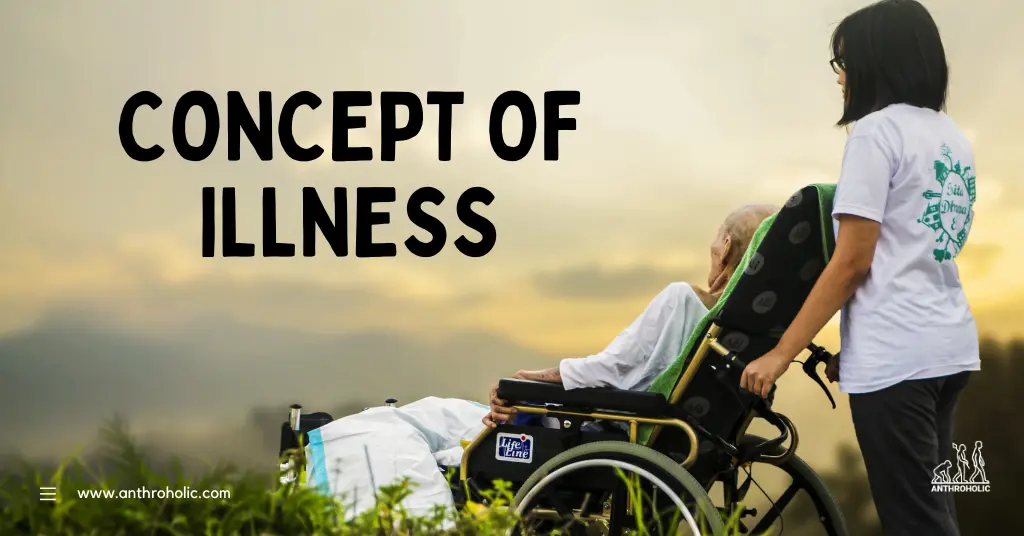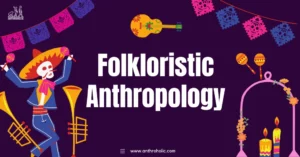AI Answer Evaluation Platform Live Now. Try Free Answer Evaluation Now
Concept of Illness
In the vast spectrum of human experience, the concept of illness occupies a central position, intricately woven into the fabric of our biological, psychological, social, and cultural existence. Illness is not merely a medical or biological phenomenon; it is a complex, multifaceted concept that resonates deeply within human life, reflecting our vulnerabilities, strengths, beliefs, and traditions. An anthropological perspective on illness delves into this complexity, uncovering the layers of meaning that various cultures and societies attach to sickness and health.

The World Health Organization’s Definition of Health
The World Health Organization (WHO) has defined health as “a state of complete physical, mental, and social well-being and not merely the absence of disease or infirmity”. This holistic definition underscores that health is multi-dimensional and emphasizes well-being across various aspects of life.
Implications of the WHO Definition
The WHO’s definition of health has significant implications for understanding illness:
- Physical Aspect: It recognizes that illness is not just about physiological dysfunction but includes the overall physical condition of an individual.
- Mental Aspect: Illness encompasses mental health, reflecting the interconnection between mind and body, and acknowledging mental disorders as legitimate forms of illness.
- Social Aspect: This definition highlights the importance of social factors in understanding illness, such as relationships, community, and societal norms.
Table 1: Aspects of Health in WHO’s Definition
| Aspect | Description |
|---|---|
| Physical | Pertaining to bodily condition and physiological functions |
| Mental | Including mental well-being, emotional balance, and mental disorders |
| Social | Reflecting social relationships, community integration, and societal influences |
Interpretations of Illness
Western Biomedical Perspective
Definition and Approach
The Western biomedical perspective of illness focuses on the biological aspects of disease, defining it in terms of pathology, symptoms, and underlying physiological disturbances.
- Pathology: Understanding the biological origin and development of diseases.
- Symptoms: Identification and classification based on observable manifestations.
- Physiological Disturbances: Relating illness to cellular or system dysfunction.
Table 1: Components of Western Biomedical Perspective
| Component | Description |
|---|---|
| Pathology | Study of the causes and nature of diseases |
| Symptoms | Observable manifestations of diseases |
| Physiological Disturbances | Disturbances at the cellular or system level leading to illness |
Non-Western Perspectives
Different cultures around the world have diverse beliefs and approaches to understanding and treating illness. Some of these are outlined below:
Traditional Chinese Medicine (TCM)
TCM perceives illness as an imbalance in the body’s energy or “Qi.” It emphasizes harmony between the body’s internal and external environments, focusing on holistic wellness.
Ayurveda
The Indian system of Ayurveda views illness as an imbalance among the body’s three primary life forces or “Doshas.” It integrates physical, mental, and spiritual aspects for treatment.
Biocultural Perspectives
Illness as a Cultural Construct
Illness is not merely a biological phenomenon but often a cultural construct that is shaped by social, economic, and political factors.
- Cultural Beliefs: Illness is perceived differently across cultures, reflecting unique worldviews and philosophies.
- Socioeconomic Factors: Access to healthcare and perceptions of illness are influenced by an individual’s socioeconomic status.
- Political Influence: Government policies and global initiatives play a role in shaping health systems and consequently affect the way illness is understood and managed.
Interactions between Biology and Culture
The biocultural perspective recognizes that biological and cultural factors are intertwined and together influence the understanding and experience of illness.
Table 2: Interactions between Biology and Culture in Understanding Illness
| Biological Factors | Cultural Factors |
|---|---|
| Genetics | Beliefs & Rituals |
| Nutrition | Healthcare Systems |
| Environment | Economic Factors |
Implications on Individual and Community Health
Personal Experience of Illness
The concept of illness is closely related to personal experiences, cultural norms, and individual interpretations. How a person perceives and reacts to an illness may differ significantly across cultures.
Community and Global Health
Understanding the cultural concept of illness plays a vital role in community health planning, policymaking, and global health initiatives.
References
[1] Engel, G. L. (1977). The need for a new medical model: a challenge for biomedicine. Science, 196(4286), 129-136.
[2] Unschuld, P. U. (1985). Medicine in China: A history of ideas. University of California Press.
[3] Chopra, A., & Doiphode, V. V. (2002). Ayurvedic medicine: Core concept, therapeutic principles, and current relevance. Medical Clinics, 86(1), 75-89.




